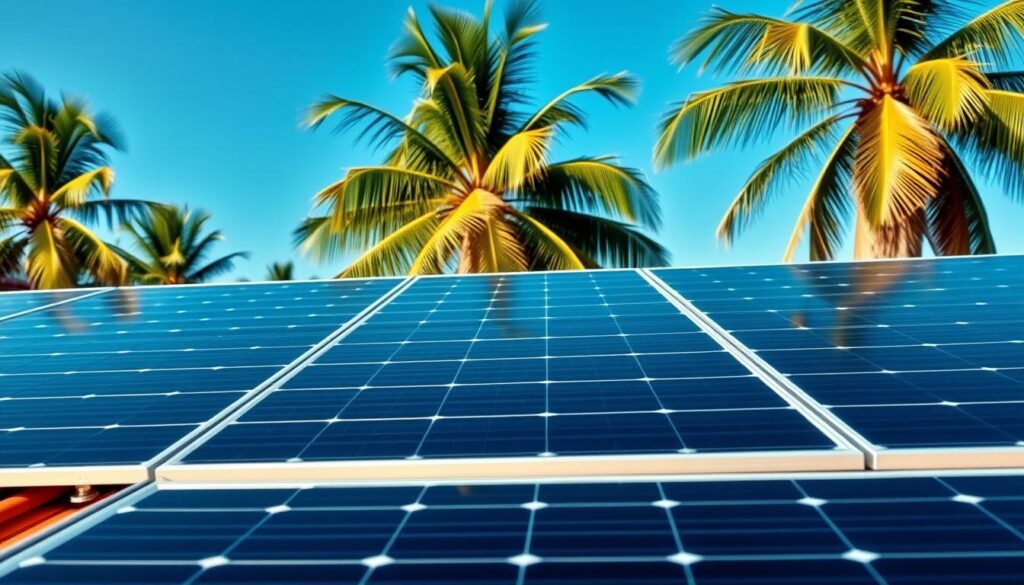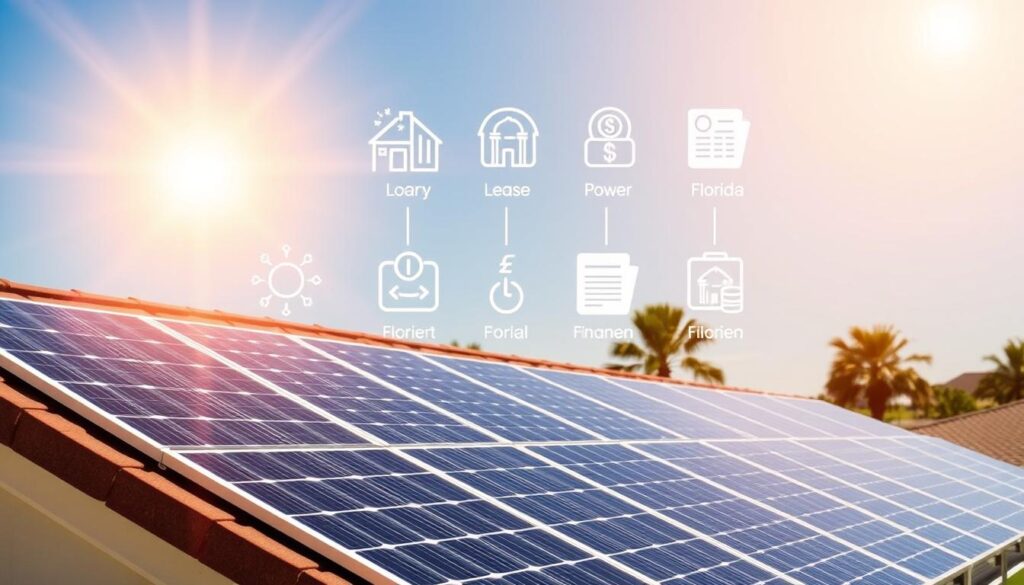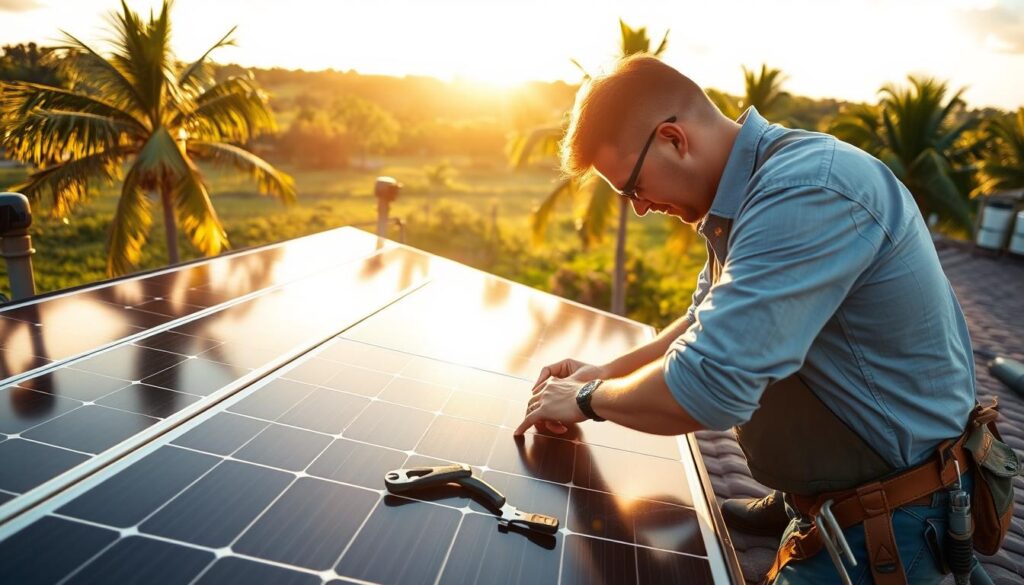Solar power is shining bright in Florida! As of March 2025, the average cost to install solar panels in Florida starts at $2.11 per watt. A typical 5 kW system costs around $10,548 before incentives. With Florida’s strong sunlight, many homeowners can slash their energy bills and see savings grow over time.
An average Florida household needs about 14.22 kW to cover electricity needs, costing roughly $29,512 before incentives. Federal tax credits cut costs by 30%, lowering that 5 kW system to $7,384. Comparing quotes from Florida’s 250+ solar companies can save up to 20% upfront.
Key Takeaways
- Average Florida solar panel cost is $2.11 per watt, 10% below the national average.
- A 5 kW system costs $10,548 before incentives, dropping to $7,384 with tax credits.
- Solar systems pay for themselves in 7.6 years, saving over $69,799 over 25 years.
- Shopping around with Florida’s 250+ installers can lower prices by up to 20%.
- Florida’s $0.14/kWh electric rates make solar savings even brighter.
Understanding Solar Panel Costs in Florida
Solar panel installation cost florida varies based on several key factors. Florida’s average cost of solar panels in florida starts at $2.71 per watt, 10% below the national average. A typical 5 kW system costs between $25,492 and $34,488 before incentives. Let’s break down what affects these numbers.
Factors Influencing Cost
System size, equipment quality, and installation complexity shape final prices. Larger systems like 11.5 kW cost $29,095 pre-incentives but save more long-term. Permit fees and local regulations add to upfront expenses. Here’s how components affect pricing:
- System size: Bigger systems spread fixed costs, lowering per-watt rates
- Equipment: Premium panels boost efficiency but cost more upfront
- Installation: Rooftop angles and shading can increase labor time
The Importance of Location
Florida’s sunlight varies regionally. Homes in Sarasota receive 5.5 peak sun hours daily, reducing needed system size. Coastal areas may face higher installation costs due to hurricane-resistant equipment requirements. Permits range from $50 to $250, varying by county.
Types of Solar Panels Available
Choose between three main technologies:
| Type | Efficiency | Cost |
|---|---|---|
| Monocrystalline | 15-22% | $0.50-$0.65/Watt |
| Polycrystalline | 14-16% | $0.40-$0.55/Watt |
| Thin-film | 11-13% | $0.30-$0.40/Watt |
Monocrystalline panels last 25+ years, making them ideal for long-term savings despite higher upfront costs.
Average Cost of Solar Panels in Florida
Understanding the cost of solar panels in Florida starts with knowing the basics. As of 2025, a 5-kW system ranges from $12,500 to $17,500 before incentives. This includes hardware, labor, and permits. Let’s break down what drives these prices.
Breakdown of Installation Expenses
- Solar panels: 40–50% of total cost
- Inverters: 15–20%
- Mounting hardware: 10–15%
- Labor and permits: 20–30%

Cost per Watt Explained
The solar panel cost per watt florida averages $2.23–$3.50. A 6-kW system costs $13,380–$17,220 installed. For example, a 5-kW system priced at $15,939 after tax credits saves homeowners $21,632 over 25 years. Federal tax credits cut costs by 26%, saving up to $5,166 for a 6-kW system.
Comparative Costs Across Regions
South Florida sees higher labor costs, while North Florida often has lower material expenses. Key cities vary:
- Miami: $2.80–$3.30 per watt
- Tampa: $2.50–$3.10
- Orlando: $2.30–$2.90
Remote areas may add $0.20–$0.50 per watt due to logistics.
Remember: Exact pricing depends on roof space, shading, and system size. Compare quotes from Florida’s 200+ installers to find the best deal.
Incentives and Rebates for Solar Panels
Florida offers multiple programs to lower solar energy cost florida and reduce florida solar panel installation prices. These incentives make going solar more affordable for homeowners across the state.
Federal Tax Credit Overview
- The 30% federal tax credit cuts costs by $3,164 on average for a $10,548 system.
- Eligible through 2032 under the Inflation Reduction Act, this credit applies to all system costs including installation and equipment.
State Incentives in Florida
Florida law excludes solar systems from state sales tax, saving homeowners 6% immediately. Property taxes also remain unchanged because solar installations don’t increase assessed value. These exemptions alone save over $600 on a $10k system.
Utility Company Rebates
Utilities like FPL, Duke Energy, and TECO offer rebates for qualifying systems. Net metering programs credit excess energy at 3–5¢/kWh, lowering monthly bills further. For example:
A 5kW system saves an estimated $69,799 over 25 years after combining all incentives.
By stacking these programs, a $10,548 system drops to around $7,384 after tax credits and rebates. Residents should verify current utility offers with their provider to maximize savings.
Financing Options for Solar Panel Installation
Choosing the right financing plan can make the cost to install solar panels in florida more manageable. Explore options like loans, leases, or cash purchases to match your budget and goals.

Upfront Payment vs. Financing
Pay cash upfront to secure immediate ownership and maximize savings. While this requires a large initial expense, it avoids interest charges. For example, a 6kW system costs around $18,750 at $3.25/watt (pre-interest). Financing spreads payments over time, making the best solar panels florida affordable without draining savings.
Solar Loans and Their Benefits
- SELF Loans: Rates from 5% to 9.5% with terms up to 20 years. Veterans and women qualify for no-credit-score loans via KIVA.
- PACE Financing: Property-assessed loans with 25-year terms. Requires 10% home equity and tax-paid history.
- Traditional Loans: Options from institutions like Suncoast Credit Union offer flexible repayment terms.
Power Purchase Agreements (PPAs)
PPAs let you pay only for energy produced, requiring no upfront costs. However, you miss out on federal tax credits and long-term savings. Leases may lock you into higher costs over time.
| Option | Cost | Ownership | Savings |
|---|---|---|---|
| Cash Purchase | $3.25/watt | Full | Highest long-term savings |
| Solar Loans | 5%-9.5% interest | Partial | Moderate savings with tax credits |
| PPAs | Pay-per-use | None | Lower overall savings |
Florida’s property tax exemptions and grants like the Dunedin Solar Energy Grant ($0.25/watt up to $2,500) reduce upfront costs. Compare terms carefully to align with your financial strategy.
Choosing the Right Solar Installer
With over 250 solar companies operating in Florida, selecting the right installer ensures your solar panel installation cost florida aligns with quality and savings. Start by requesting quotes from at least three providers to compare florida solar panel cost and services. A well-chosen installer can help you navigate permits, warranties, and long-term efficiency.
Questions to Ask Potential Installers
Ask these key questions to evaluate reliability:
- How many years of Florida-specific solar experience do you have?
- Do you hold a Florida Certified Solar Contractor (CV) license?
- Is your team NABCEP-certified?
- What’s your process for handling permits and inspections?
- Will you provide a 10+ year workmanship warranty?
Experience and Reviews Matter
Choose installers with at least five years of experience. Check reviews on Google, Yelp, and the Better Business Bureau. Look for patterns in customer feedback about professionalism and post-installation support. Ask for referrals from past clients in your area.
Certifications to Verify
Verify these credentials before signing contracts:
- NABCEP certification for installers
- Florida’s CV license (requires 4+ years of experience and passing state exams)
- Manufacturer-specific training (e.g., Tesla, SunPower)
- Full insurance coverage (workers’ comp, liability)
Avoid companies pressuring you to sign without comparing quotes. Reputable installers like Solar Energy World, active for over 15 years, prioritize transparency in pricing and warranties.
Benefits of Installing Solar Panels
Switching to solar energy offers more than just lower electricity bills—it’s a long-term investment that pays off in savings, equity, and environmental impact. While the solar energy cost florida varies, the rewards often outweigh the average cost of solar panels in florida over time.
Monthly Savings That Multiply:A 7.2 kW system saves $130 monthly, totaling $50,000 over 25 years. Net metering credits excess energy back to the grid, and tax credits like the 30% federal ITC amplify these gains. With utility rates rising, these savings grow steadily.
- A 5 kW system costs about $13,000 before incentives but cuts bills by $150/month.
- Florida’s 237 sunny days annually maximize energy production, ensuring consistent returns.
Home Value Boost:Solar panels add 4.1% to home value, raising a $391,213 home by $16,039. Florida law keeps property taxes the same even after installation, so you gain equity without extra costs.Clean Energy Impact:A standard system reduces carbon emissions by 3–4 tons yearly—equivalent to removing two cars from roads. Florida’s net metering policies let you sell unused energy back at full retail rate, turning sunlight into both savings and sustainability.
From financial perks to environmental wins, solar energy in Florida aligns with both budgets and values. With sunny days and smart policies, the payoff starts now and lasts decades.
Challenges and Considerations
Navigating thecost of solar panels in Floridaandsolar panel installation cost floridarequires weighing upfront expenses against long-term benefits. Florida’s climate and financial factors play key roles in this decision.
Weather and Its Impact on Solar Efficiency
Florida’s 230 sunny days annually provide strong potential, but hurricanes and heavy storms can temporarily reduce energy output. Modern panels are engineered to withstand winds up to 140 mph, but debris damage may require repairs. Cloudy winter months may lower production by 10–15%, though systems are designed to balance seasonal fluctuations.
Initial Investment vs. Returns
Thesolar panel installation cost floridaranges from $10,000 to $25,000 before incentives. A $35,000 system qualifies for a 30% federal tax credit, reducing costs to around $24,500. Payback periods average 6–10 years, with savings reaching $1,680 annually for larger systems.

Maintenance Requirements
Regular upkeep includes:
- Biannual inspections for debris
- Every 5-year inverter replacement ($1,400–$4,200)
- Optional battery storage adding $7,000–$14,000
Rain and humidity may reduce dust buildup, lowering cleaning needs. Despite these factors, systems retain 80% efficiency after 25 years, ensuring lasting value.
Balancing these considerations with Florida’s abundant sunlight and financial incentives helps homeowners make informed decisions.
How to Estimate Your Solar Needs
Knowing your energy needs starts with simple steps. Florida’s sunny climate means systems like a 14.22 kW setup often cover home usage. Let’s break it down:
Solar Calculator Tools
Use online tools like EnergySage, used by over 81,000 Florida homeowners, to estimate your system size. Input your monthly electricity bills and location for instant estimates. Most calculators show how solar panel cost per watt florida impacts total expenses.
Assessing Your Energy Consumption
- Review 12 months of electric bills to find average monthly usage (kWh).
- Multiply by 1.25 to account for Florida’s summer AC demand.
- Divide by 450 watts (average panel output in 2025) to estimate panels needed.
Roof Space Considerations
Measure your roof’s usable area. South-facing roofs maximize efficiency. Shade from palm trees or chimneys reduces output by up to 25%. A 6 kW system needs 15–24 panels, depending on roof layout.
| System Size | Panels | Cost Range |
|---|---|---|
| 2 kW | 5–8 panels | $4,960–$6,740 |
| 6 kW | 15–24 panels | $13,880–$18,220 |
| 10 kW | 25–40 panels | $23,300–$29,700 |
Using these tools and data ensures your cost to install solar panels in florida aligns with your energy goals. Always verify with installers after self-estimates!
Installation Timeline for Solar Panels
Planning for florida solar panel installation prices involves understanding how long the process takes. From contract signing to activation, most homeowners wait 3–6 months. Here’s what to expect:
- Site Assessment & Design: Contractors evaluate your roof and energy needs. This stage takes 2–6 weeks, including design approval with your input.
- Permitting: Approvals from local authorities can take 2–11 weeks due to varying HOA rules and city processes.
- Installation: Physical setup usually finishes in 1–3 days for most homes. Larger systems may need up to a week.
- Inspections & Activation: Utility companies and inspectors finalize connections. This step often delays timelines by 4–6 weeks.
Working with best solar panels florida installers like Freedom Solar reduces delays. Their in-house teams handle permits and inspections faster, cutting overall time by weeks.
- Key delays: Permit backlogs, utility interconnection reviews, and equipment shortages.
- Fast-track options: Pre-qualified installers and clear HOA approvals shave 20–30% off timelines.
Freedom Solar highlights: “Our clients save 1–2 months by using our streamlined process,” says their project manager. For example, a typical 6-kW system takes 3–4 months from start to finish when choosing reputable providers.
Always confirm timelines with your installer. While florida solar panel installation prices vary, faster service often comes from certified teams with local permitting expertise.
Case Studies: Florida Homeowners’ Experiences
Real stories from Florida residents highlight how solar panels work in practice. Here’s what homeowners across the state are experiencing with solar energy cost florida and system performance.
Cost Experiences from Different Regions
- South Florida: A Miami family installed a 6kW system with LG panels. After tax credits and rebates, their florida solar panel cost totaled $9,500. They now save $150/month on bills.
- Central Florida: An Orlando homeowner chose SunPower panels for a 8kW system. Final cost after incentives was $12,000. Their payoff period was 7 years.
- Panhandle: A Pensacola home used Tesla’s solar roof. At $13,000 post-incentives, they cut energy bills by 60% in year one.
Homeowner Testimonials
“We paid $10k upfront but saved over $20k in 10 years. The solar energy cost florida was worth every penny.” — Carlos, Tampa
A Jacksonville resident noted: “The sales tax exemption made a $2,000 difference in my final florida solar panel cost.”
Lessons Learned from Installations
Key takeaways from homeowners:
- Shop around—prices vary by 20% between installers.
- Check HOA rules before signing contracts.
- South-facing roofs capture 15% more energy in Florida’s climate.
Comparing Solar Panel Brands and Models
Selecting the best solar panels florida requires balancing performance, durability, and cost of solar panels in florida. Florida’s hot climate demands panels that maintain efficiency in high temperatures. Here’s how top brands stack up:
Top Brands in the Market
Leading brands like Maxeon (SunPower), Q Cells, Trina Solar, REC, and Panasonic dominate the market. Maxeon’s 40-year warranty and 22.8% efficiency lead the pack. Q Cells and Trina offer competitive pricing with 20.9% to 21.1% efficiency. REC and Panasonic panels match Maxeon’s 25-year warranties but cost less upfront.
Features to Compare
- Efficiency: Higher percentages mean more energy per panel.
- Temperature Coefficient: Lower numbers (-0.24% to -0.34%) reduce output drops in heat.
- Longevity: Panels like Maxeon degrade at just 0.25% yearly, retaining 92% efficiency after 25 years.
Warranties and Lifespan
| Brand | Efficiency | Warranty | 25-Year Output |
|---|---|---|---|
| Maxeon 6 | 22.8% | 40 years | 92% |
| Q Cells | 20.9% | 25 years | 85.5% |
| Trina Vertex S | 21.1% | 25 years | 84.8% |
| REC Alpha | 22.3% | 25 years | 92% |
| Panasonic | 22.2% | 25 years | 92% |
Maxeon’s 40-year warranty stands out, but mid-tier options like Q Cells save upfront costs while still offering strong warranties. Pairing these with the 30% federal tax credit lowers long-term costs significantly. Research local installers like Blue Raven Solar or Palmetto to see how brand choices impact the cost of solar panels in florida for your home.
Future of Solar Energy in Florida
Florida’s solar energy landscape continues to evolve, driven by technological innovation and shifting policies. As the state embraces cleaner energy, homeowners can expect changes that could shape long-term savings and system performance.
Trends in Solar Technology
Advances in solar tech promise more efficient panels and better energy storage. New models may reduce the solar panel cost per watt florida by improving power output. Smart home integration could also streamline energy management, making systems easier to monitor and optimize.
Policy Changes Impacting Solar Adoption
Legislative updates could alter solar economics. The federal tax credit remains at 30% until 2032 but drops afterward. State policies, like net metering rules, might shift too, affecting how excess energy credits are applied. Staying informed about these changes ensures homeowners maximize savings.
Predictions for the Solar Market
Over the next five years, solar energy cost florida could drop as production scales. Wider adoption may lead to shorter payback periods, potentially lowering the average solar panel cost per watt florida further. While challenges like regulatory shifts exist, long-term trends favor growth, making now a strategic time to invest before incentives shrink.
